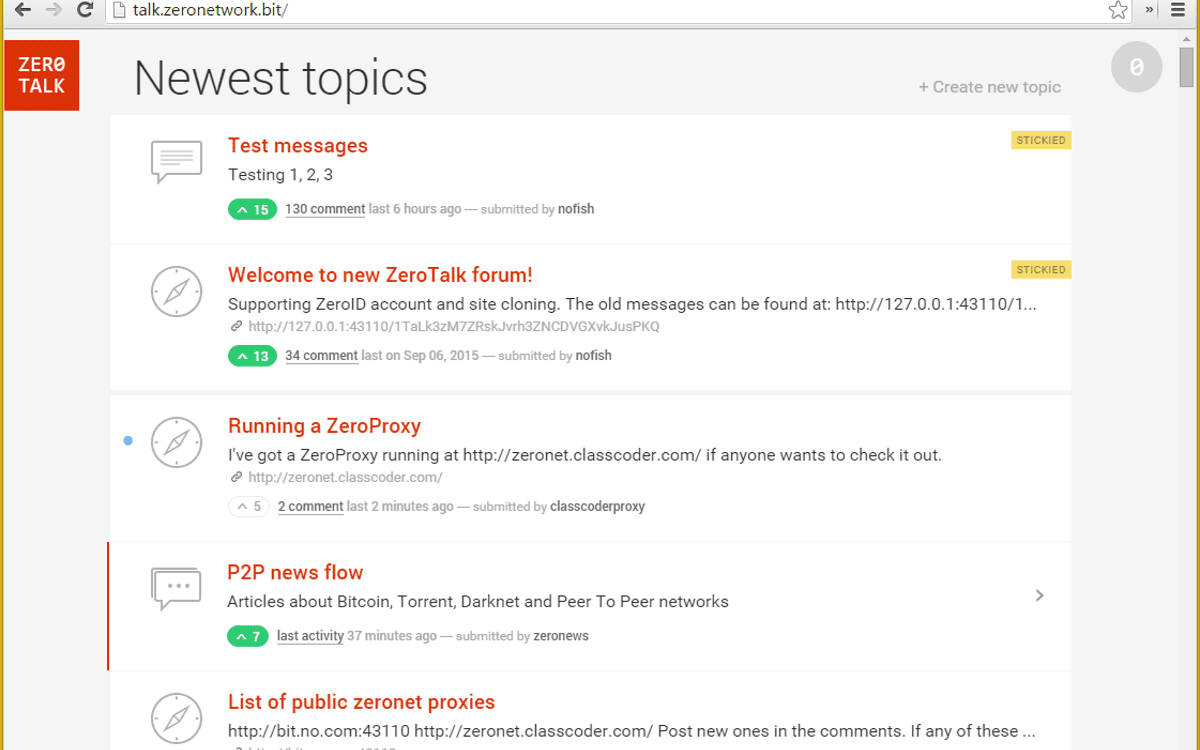
ZeroNet is a decentralized web platform, which suggests using Bitcoin targeting and verification mechanisms in combination with BitTorrent distributed delivery technologies to create sites that cannot be censored, tampered with, or blocked.
The content of the sites is stored in a P2P network on the machines of the visitors and is verified with the owner's digital signature. For addressing, the Namecoin alternate DNS server system is used.
The data published on the site is verified and linked to the account of the site owner by analogy with the linking of Bitcoin wallets, which also allows to control the relevance of the information and update the content in real time.
An anonymous Tor network can be used to hide IP addresses, in addition to the fact that the user can participate in the distribution of all the sites that are accessed. After downloading to local system, files are cached and available for distribution from the current machine using methods reminiscent of BitTorrent.
Among the main characteristics that can be highlighted, we can find:
- Single point of failure missing: site remains accessible if there are at least one pair in the distribution
- Fully decentralized - the site cannot be shut down by disabling the hosting as the data is placed on all visitor machines
- All the information seen above is available in the cache and can be accessed from the current machine offline, without access to the global network.
- Supports content updates in real time
- Possibility of addressing through the domain registration in the ".bit" area
- Work without preliminary configuration - just unzip the software archive and run a script
- The ability to clone sites with one click
- Passwordless authorization based on the BIP32 format: the account is protected by the same cryptographic method as the Bitcoin cryptocurrency
- Built-in SQL server with P2P data sync functions
- The ability to use Tor for anonymity and full support for the use of hidden Tor services (.onion) instead of IPv4 addresses
- Support for TLS encryption
- Automatic availability through uPnP
- The ability to attach multiple authors with different digital signatures to the site
- The presence of a plugin to create multi-user configurations (openproxy)
- Support for news transmission
- It works in any browser and operating system.
How to install ZeroNet on Linux?
ZeroNet installation is fairly straightforward and it just requires that you have the most current version of Python on your system.
In order to get ZeroNet We just have to open a terminal and execute the following commands in it:
wget https://github.com/HelloZeroNet/ZeroNet/archive/py3/ZeroNet-py3.tar.gz
tar xvpfz ZeroNet-py3.tar.gz
cd ZeroNet-py3
To view ZeroNet sites, simply use the zeronet.py script:
python3 zeronet.py
Then just open the sites in the browser via the URL
http://127.0.0.1:43110/zeronet_address
Where zeronet_address is the address of the site they want to visit. For example:
http://127.0.0.1:43110/1HeLLo4uzjaLetFx6NH3PMwFP3qbRbTf3D
When the site is opened, the program searches for the closest pairs and loads the files associated with the requested page (html, css, images, etc.).
To create a site, just run the command
zeronet.py siteCreate
And then the site identifier and private key will be generated to confirm authorship by digital signature.
An empty directory of the form "data / xxx ..." will be generated for the created site.
After changing the content of this directory, the new version must be certified using the command "zeronet.py siteSign site identifier" and entering the private key.
As soon as the new content is certified, it is necessary to advertise it with the command "zeronet.py sitePublish site-identifier" so that the modified version is available to peers (using the WebSocket API to announce the changes) thereby Through the blockchain, peers will verify the integrity of the new version by digitally signing, uploading new content, and streaming it to other peers.